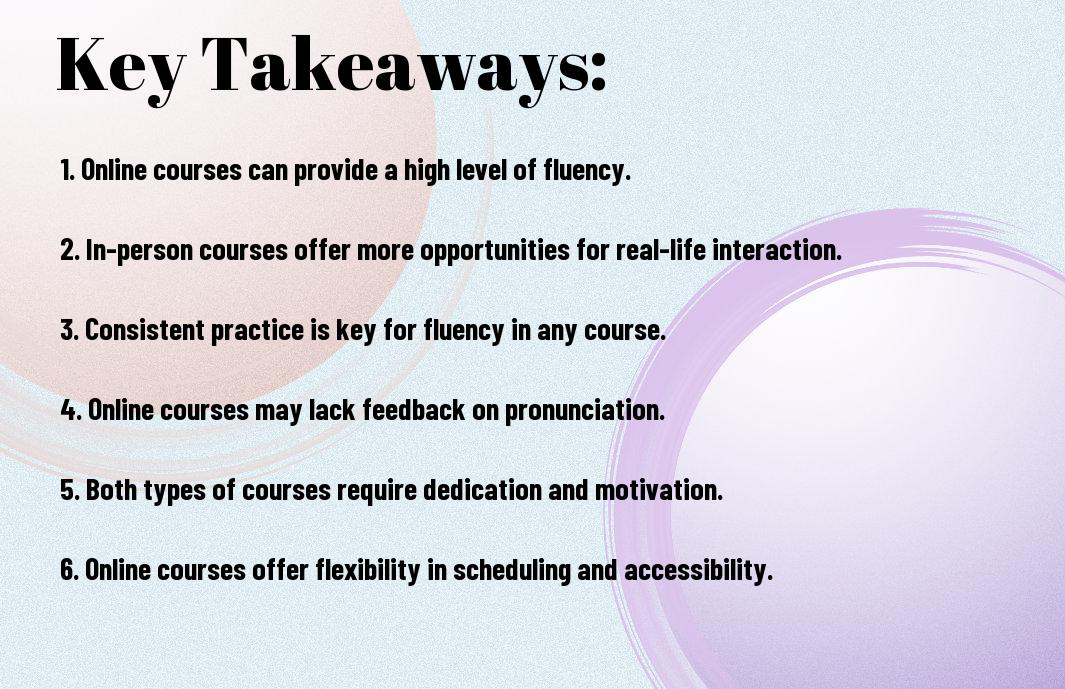With the rise of online education, you may be wondering if virtual language courses can truly match the fluency achieved through traditional in-person classes. In this exploration, we will probe into the effectiveness of online language learning platforms and their ability to provide you with the same level of language proficiency as in-person courses. So, let’s unravel the nuances of both approaches and uncover the path to mastering a new language.

Key Takeaways:
- Flexibility: Online language learning courses offer flexibility in terms of time and location, allowing learners to study at their convenience.
- Interactive Features: Many online courses include interactive features such as virtual classrooms, multimedia resources, and language practice exercises to enhance the learning experience.
- Self-discipline: Success in online language learning courses requires self-discipline and motivation, as there may be less external accountability compared to in-person courses.
The Rise of Online Language Learning
The convenience factor
For busy individuals juggling work, family, and other commitments, online language learning courses offer unmatched convenience. You can access lessons from anywhere with an internet connection, fitting study sessions into your schedule with ease. No more rushing to make it to in-person classes after work or on weekends. With online courses, you have the freedom to learn at your own pace, whether it’s early in the morning or late at night.
Accessibility and flexibility
To add to the convenience factor, online language learning platforms often provide a wide range of languages to choose from, allowing you to pick a language that aligns with your interests or goals. Additionally, the flexibility of online courses means you can revisit lessons as many times as needed, reinforcing your understanding and gradually improving your fluency. Unlike in-person classes that follow a set schedule, online courses put you in control of your learning journey.
This blend of accessibility and flexibility is especially advantageous for individuals with unpredictable schedules or those living in areas where in-person language courses may be limited or unavailable. Online language learning breaks down barriers and opens up a world of linguistic possibilities, empowering you to explore new languages on your terms.
In-Person Courses: The Traditional Approach
Clearly, in-person language courses offer a traditional approach to learning that has proven to be highly effective. According to Self Paced Vs. In Person Language Lessons, one of the key advantages of in-person courses is the immersive environment and the opportunity for real-time interaction with instructors and classmates.
Immersion and interaction
Interaction plays a crucial role in language learning as it allows you to practice speaking, listening, and responding in the target language in real time. In-person courses provide you with the chance to engage in conversations, participate in group activities, and receive immediate feedback from your instructor, all of which contribute to a more dynamic learning experience.
Personalized feedback and correction
For personalized feedback and correction, in-person courses excel in providing individual attention to your language skills. Your instructor can identify your strengths and weaknesses, tailor the lessons to focus on areas that need improvement, and offer corrective feedback in real time. This personalized approach helps you address specific language challenges and makes the learning process more efficient.
For instance, when you make a mistake during a speaking exercise, your instructor can immediately correct your pronunciation or grammar, helping you to understand the error and guiding you on how to improve. This instant feedback loop is invaluable in honing your language abilities and accelerating your progress towards fluency.
The Limitations of Online Courses
Despite Comparing online language classes to In-Person Instruction, online language learning courses have their limitations that may affect the level of fluency you can achieve.
Lack of human interaction
Lack of human interaction is one of the main drawbacks of online language courses. Language learning is not just about the words and grammar; it’s also about communication and cultural nuances. Without face-to-face interaction with instructors and peers, you may miss out on the opportunity to practice speaking and listening in real-life situations. This can hinder your ability to become truly fluent in a language.
Limited feedback and self-assessment
Self-assessment is crucial in language learning, but online courses may provide limited opportunities for you to receive immediate feedback on your progress. In a traditional classroom setting, instructors can give instant corrections and guidance, helping you to improve your language skills effectively. Without this immediate feedback loop, you may find it challenging to identify and correct your mistakes, potentially slowing down your progress.
Limited feedback and self-assessment can be detrimental because language learning is a gradual process that requires constant evaluation and improvement. Without timely feedback, you may unknowingly reinforce errors or struggle to pinpoint areas that need focus, ultimately affecting your fluency in the language.
The Advantages of Online Courses
Cost-effectiveness and affordability
Not everyone has the financial means to enroll in traditional in-person language courses, which can often come with hefty tuition fees, commuting costs, and expensive textbooks. With online language learning courses, you have the advantage of accessing high-quality education at a fraction of the cost. Many online platforms offer subscription-based models or one-time payments for lifetime access, making it a more affordable option for those on a budget.
Access to a wider range of resources
With online language courses, you have the opportunity to tap into a vast pool of resources that may not be available in traditional classroom settings. From interactive exercises, video tutorials, and virtual language exchange forums, you have the flexibility to choose the resources that best suit your learning style. Whether you prefer visual aids, audio lessons, or interactive quizzes, online courses cater to a variety of learning preferences.
Another benefit of online language learning is the ability to access authentic materials from native speakers, such as podcasts, music, movies, and articles. These resources not only expose you to the nuances of the language but also immerse you in the culture, helping you develop a deeper understanding and appreciation for the language you are learning.
Can Online Courses Provide the Same Level of Fluency?
Now, let’s examine into the debate on whether online language learning courses can offer the same level of fluency as traditional in-person courses. The effectiveness of online language courses hinges significantly on your commitment and dedication to consistent practice.
The role of consistent practice and dedication
Courses that you take online can be just as effective as in-person classes if you dedicate yourself to regular practice. Consistency is key when it comes to language learning. By setting aside dedicated time each day to engage with the material, practice speaking, listening, reading, and writing in the language you’re learning, you can make significant strides in your fluency.
The importance of self-motivation and discipline
An imperative component of succeeding in online language courses is your level of self-motivation and discipline. Without the structure of weekly in-person classes, it’s up to you to keep yourself on track. You must set goals, monitor your progress, and hold yourself accountable for your learning. The convenience of online courses can sometimes lead to procrastination, so staying motivated and disciplined is crucial for achieving fluency.
Consistent practice, along with self-motivation and discipline, are the cornerstones of your success in online language learning courses. By committing to regular practice, staying motivated, and holding yourself accountable, you can achieve fluency in a new language, even through online platforms.

Overcoming the Challenges of Online Learning
Once again, you find yourself facing the challenges of online language learning. While convenient, online courses can sometimes present hurdles that must be overcome to achieve fluency.
Creating a Conducive Learning Environment
Creating a conducive learning environment is crucial for your online language learning journey. Set aside a dedicated space for your study sessions, free from distractions. Make sure you have all the necessary materials at hand, such as notebooks, pens, and any technology required for the course. By creating a comfortable and organized space, you can better focus on your learning goals.
Staying Motivated and Engaged
Overcoming the challenge of staying motivated and engaged is imperative for successful online language learning. It can be easy to lose focus when studying independently, so it’s important to keep yourself motivated. Set specific, achievable goals for each study session and track your progress. Additionally, find ways to make the learning process engaging, such as practicing with language exchange partners or using gamified language apps to keep things interesting.
Remember that consistency is key when it comes to language learning. Find what works best for you to stay motivated and engaged, whether it’s setting aside dedicated time each day for study or mixing up your learning routine to keep things fresh and exciting.

To wrap up
On the whole, when considering whether online language learning courses can provide the same level of fluency as in-person courses, it’s crucial to acknowledge that both options have their strengths and weaknesses. While online courses offer convenience and flexibility, they may lack the immersive experience and real-time interaction that in-person courses provide. That being said, your dedication to practicing consistently, seeking out opportunities for conversation, and utilizing supplementary resources can greatly impact your language learning journey regardless of the format you choose. Ultimately, the key to achieving fluency lies in your commitment and investment in the learning process, whether online or in-person.
Q: Can online language learning courses be as effective as in-person courses for achieving fluency?
A: Yes, online language learning courses can provide the same level of fluency as in-person courses. Many online platforms offer interactive lessons, personalized feedback, and opportunities for real-time practice with native speakers, all of which are key elements for language fluency.
Q: How can online language learning courses help in achieving fluency?
A: Online language courses often use innovative technology and tools such as audio and video lessons, chatbots for conversation practice, and language exchange forums to enhance the learning experience. These interactive features can simulate real-life language scenarios and contribute to fluency development.
Q: What are some advantages of online language learning courses over in-person courses?
A: Online language learning courses offer flexibility in terms of pace and schedule, allowing learners to study at their own convenience. Additionally, online courses are often more affordable than in-person classes, making language learning more accessible to a wider range of people.
